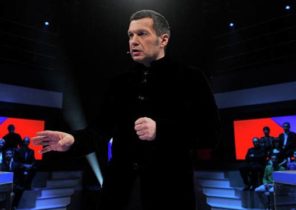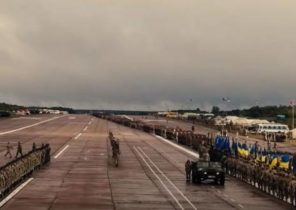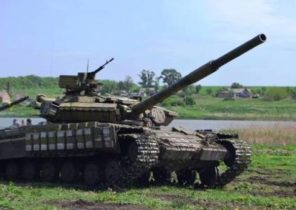
“To have good relations with Russia is good, not bad” says the US President-elect Donald trump. “To be the subject of international relations is better than an object” — said Ukrainian experts and politicians. “To be rich and healthy — better than poor and sick” — says the proverb. “To sell something unnecessary, you must first buy something unnecessary, and we have no money” — responds the classics of recent times.
With a light hand retired American strategists and pastaigaties Ukrainian philanthropists in Ukraine is intellectual wave — how would we sell something that the “powers that be” would want us to buy and instead guaranteed the peace?
Myslevirus “big game” took experts, journalists and public figures: some make ambitious projects a new “Yalta”, others branded the first a disgrace and a betrayal, others giggling in the bushes and enjoy verbal duels, where the burned ideas, forecasts and reputation “competitors”. More is accepted in good faith inspires the thought that if not a few weeks, it is already sure in a few months, trump and Putin officially signed (and possibly in Yalta, because the tradition requires) a comprehensive Pact, which will present Ukraine on a platter to Putin (and Syria or Iran, or even both — Trump).
It can be expected that the agreement will, of course, concluded “due to the Ukraine without Ukraine”. Apocalyptic assumptions are inflated not only omnivorous social networks, but also well-respected publications such as The Times, which gives the image of a conspiracy of perfection and invincibility.
A natural question arises: “How to be saved?”. And Ukraine is expected is divided mainly into two camps: those who offer to “sell” sovereignty and its own historical choice in exchange for territorial integrity and the restoration of legal borders (the concept of “the West is not waiting for us”), and those who advocate for the “sale” of the territories in exchange for sovereignty and real independence (the concept of “cut piece”). Both camps bring serious arguments and operate on convincing emotions. Reasoned argument on the subject of life issues.
But is it not premature trades? Whether buyers are already lined up and waiting for offers? Whether lined up are bona fide buyers? Whether the seller goods, which he offers for sale? And not disingenuous if he is too artless to experienced merchants who understand more than it seems to the seller?
To understand the situation should be analogies from the past. And the past shows that all the significant scope of the agreement achieved, “the powerful” only in certain historical trajectories, where mutual trust and common interests reach the level where it is possible to big deal (big deal).
It happened during the Second world war, when the anti-Hitler shared experience and recognition of the role of the USSR in the victory over Hitler “great” agreed in Yalta and Potsdam in trouble weaker. Then “on a platter” Stalin gave the whole of Central Europe, where the Soviet Union 40 years have established their own rules, depriving dozens of Nations of Europe sovereignty. This formed one element of the traumatic totalitarian experience, which makes us necessary to “Wake up night”: do not fly the aircraft again at Yalta?
The second time it happened in Helsinki in 1975 — due to the long-term policy of “detente”, when the degree of confrontation between the “two systems” has significantly decreased and was awarded the Helsinki founding act, which was a compromise, painful for many, but finally helped to destroy totalitarianism.
The third time the “Grand bargain” informal concluded Reagan and George H. W. Bush with Mikhail Gorbachev: it was fair “Antilla” when the Soviet Union peacefully and pledged not to interfere with the sovereign choice of yesterday’s “socialist” European countries, if they decide to become part of the “collective West”. In the latter case, the “warming” was particularly stormy and gave rise to the West long lasting euphoria from the “wind of change”, paulsego then from Moscow. But this, in our feeling perfectly fair, “Grand bargain” gave birth syndrome traumatic lesion is on the other flank geopolitical swing in Russia. And the consequences we suffered only recently, when the “brother” suddenly came to visit.
Does the current situation in the world even remotely one of the examples described the moment when the “Grand bargain” was possible? Trust? Remuneration for participation in the overall mission? Calculations on the reliability of the partner? The coincidence of indigenous interests? Sincere sympathy?
Today serious reasons to expect another “Grand bargain,” no. The level of trust between the Kremlin and conditional “collective West” — at zero. Last year, taking into account Putin’s actions in Syria have only added to the problems. Under such circumstances, the parties can negotiate to authenticate each other, to test to resolve some local, but to a “Grand bargain” will not come. The question may arise: should Ukraine become a “follower” of the process? Where there is no trust, to try to repair? Where there lacks a common agenda — to try to offer? Where there is strategic confusion and uncertainty, to offer a clear course of action? The answer may seem paradoxical: no, not necessary.
Ukraine does not have the resource to smodelirovat breaking the current historical trajectory of the world for the better, and any “best offer” will appear to be only parties that are not interested in a strong, successful Ukraine, who are aware of their targets and consistently trying to move to them. Any suggestions of the “positive agenda” in fact will only blur the contours a little weak, but still noticeable spine of the New Ukraine, which only began to assert itself after the revolution of dignity.
Even assuming a very unrealistic but theoretically possible “Grand bargain” the “powers that be” in the present historical conditions, it can take place only on condition of Russia, which believes that grasped God by the beard, and not on the terms of the West, which is located in a strategic frustration, and certainly not in Ukraine. Therefore, our task is not to give such agreement to take place (fortunately, there are enough preconditions) and especially not be among its shareholders. Otherwise you will inevitably lose.
Now is not the time for a best Ukraine agreements, so constructive strategy is to delay any attempt to impose us the game in the “Grand bargain” price, how to write “painful compromises” that no one will appreciate. The conditional extension of the initiative “comprehensive settlement” could ruin Ukraine from inside and from outside.
From the inside — because there is no perceived active part of society, the nerve of which is now very sensitive to play with him in “cheating” without the risk of big Bang. From the outside — because it would ruin though not as numerous as we would like, but a prominent and influential circle of systemic and situational allies in the confrontation with Putin’s Russia.
First of all will be demotivated and demoralized those partners, who against all odds continue to see Ukraine as an integral part of European and Euro-Atlantic space and support it in the EU institutions and NATO. If Kiev will abandon its visionary goals these partners will wave his hand to us and somehow survive. But it is naive to think that losing these allies, we instead get the others — those who now does not see in Ukraine a special strategic value.
They will not see it in the future, no matter how we tried to adapt to their expectations. Spineless Ukraine is selling strategic vector of its movement, is not a commodity that a buyer in today’s pragmatic world. Except that I would go “carcasses” in a certain direction. These arguments could be considered rhetorical slogans, if we hadn’t had in recent history are examples of delays and unrealistic expectations for harmony and resolution in response to the nomination even “the most constructive initiatives.”
Recall is not very well known even in expert circles, the experience of coordinated initiatives between Ukraine and the European Union regarding the response to the “concern of Russia” on the occasion of the Agreement on Association Ukraine-EU. This happened in 2015, when some people thought enough to formulate a set of rational answers to publicly articulate Russia “concern” — and the conflict will be settled. The consultation lasted almost a year and a half, to the accompaniment of war. Ukraine and the EU proposed a step-by-step response to each of the stated Russian concerns — relying on the text of specific articles of the Agreement and the related interpretations.
As a result, in November 2015, the Russian delegation headed by the then Minister of economic development Ulyukaev rejected the package as completely unacceptable. A counter-offer of the Russian side would be the actual dismantling of the Association Agreement as a whole — i.e., the refusal of Ukraine’s adaptation to European technical regulations and standards in all important spheres of regulation. The illusion dissipated. All remained in their original positions. The experience of those negotiations should examine all who offer or will offer in the future good model “constructive arrangements” in the details where there is no agreement to agree in principle.
So today we try again to sell Russia’s “neutrality” or “non-alignment”, the refusal from intentions to join NATO or enter into any binding political and security agreement (and neutrality constitute a waiver of important part of its sovereignty — the right to determine the allies in the field of security and defence). It is unclear why such a proposal should be interesting Moscow. All previous experience shows that — not interested.
Here are just two historical facts.
First. As of March-April 2014, Ukraine was legally enshrined “non-bloc” status, and officially removed from all documents intent to become in the future a member of NATO. And how it helped Ukraine? Did Russia’s annexation of Crimea and to start a hybrid war in the Donbass?
Second. Moldova at the 1994 constitutional secured their neutrality in the hope of resolving the Transnistrian conflict, removing the concern of Moscow concerning the drift of Moldova to NATO. It’s been 22 years: no substantive progress in the political settlement. Despite the fact that nearly a quarter of a century on the Dniester do not shoot that line of demarcation is easy to cross people and vehicles that even the Pro-Russian President in Chisinau chose — and not for the first time. But no progress, and I think hope will be able to move from a dead point, is not necessary.
So why should we assume that in the Ukrainian case will be different, if the voltage level of antagonism conflict, the number of victims and the stakes are much higher and the level of trust between the “conditional guarantors” much lower? Wouldn’t it be better to arm another, more realistic version of political realism and recognize that the conflict with Russia is fundamental, which is caused by the deep rejection by Russia of the fact of Ukraine’s independence (at least in its legitimate boundaries), and therefore will not be fully resolved for the foreseeable future (probably several decades)? Specific manifestations of this conflict, such as the annexation of Crimea and de facto occupation of part of the Donbass, are only manifestations, and cannot be reliably resolved separately from its fundamental basis. What can realistically be achieved with proper effort in the short term?
Try to predict on the example of Donbass as one of the “fields” of the conflict. Worst case: a relatively stable cease-fire, a limited dilution of the armed forces without restoration of the full socio-economic communications through the line of delimitation, the actual isolation of the occupied zone (relaxed version of the Karabakh scenario).
Best option: sustainable ceasefire, solve humanitarian problems (for the full exchange of prisoners and hostages), breeding of arms and partial demilitarization, recovery free but controlled movement of people, vehicles and goods across the line of demarcation, certain steps to restore confidence, the legalization of economic and social relations without a full-scale political settlement (the Transnistria scenario). Both conditional script outline, in our opinion, the corridor of opportunity that exists with the current balance of forces between Ukraine and Russia and in the world as a whole. Any going beyond the boundaries of this corridor is possible only when changing the current power/political balance.
Maintaining balance requires resources and effort — at least symmetrical to the efforts of the opposite side. To think about the formulas full settlement of the conflict will not interfere, and does not need to stigmatize such attempts, however, the practical impact of these efforts is unlikely to go beyond the impact of the Russian “Kozak plan” for Moldova and Transdniestria in 2003, which failed, with much better preconditions for implementation than any of the suggested today or tomorrow plans a comprehensive settlement of the conflict between Ukraine and Russia. Responsible outlet for the Ukrainian government and society to prepare for a long game that will last decades. A key plot nearest the horizon of history will be a competition of values, models of government, economy, formats identity.
In your current conflict Ukraine and Russia will be a decisive test of the viability as a state and as a society. And the final contours of future realities that will determine the solution to the fundamental conflict between Ukraine and Russia, hardly belong to the sphere of competence of the present generation.







